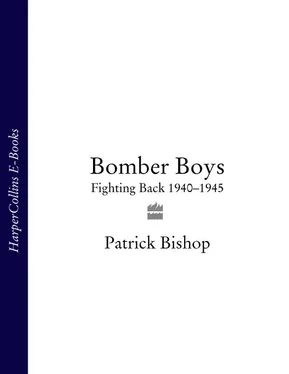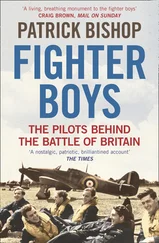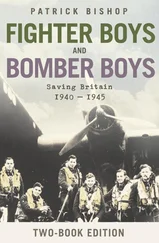The start of the Blitz reinforced the realization that the air was now a crucial battlefield as well as the belief that it was in the sky that the war would be decided. Bill Farquharson, who had been raised in Malaya where his father was in the colonial service and was awaiting call-up, was serving with Air Raid Precautions in Birmingham when he was ordered to rush to Coventry to help out after the raid. The experience made him ‘angry and yet dead scared’. He felt no particular desire for revenge. He had already made up his mind to go into the air force and the experience ‘confirmed the fact that I preferred to be up [in the air] rather than down there’. 19
Len Sumpter, a Corby steelworker and former Grenadier who had been recalled to the colours at the start of the war, was training recruits at the Guards Caterham depot when it was hit by German bombs. ‘We took a real hammering,’ he said. ‘A lot of people were killed there.’ When advertisements appeared calling for volunteers for aircrew he applied, impelled by the thought of ‘a little bit of excitement’ and ‘a bit of personal anger’. 20
Britain’s vulnerability was brought home to Ken Newman when in August 1940, a month after his eighteenth birthday, he watched Croydon airport being attacked by waves of Stuka dive-bombers. When the Blitz began he made his way each day from his home in Norbury to the City where he worked in the accounts department of a mortgage company. One Sunday night in October, the sirens sounded and he hurried his parents to their air-raid shelter. He was ‘just closing the door when I heard bombs screaming down towards us. There was no mistaking they were about to hit us or fall very close indeed and I must admit that I was very frightened and thought our end had come. Crump went the first bomb, quite near … accompanied by the sound of splintering wood, smashing glass and falling masonry …’ So it went on. When quietness returned he opened the shelter door. The air was swirling with brick dust and the house was gone. There was ‘no sleep for us at all that night. My mother was weeping in a corner of the shelter, partly over the loss of her much-loved home and also in relief that we had survived.’ Later, when asked for his reasons for wanting to join the RAF he told the chairman of the selection board that he was ‘keen to become a bomber pilot in order to have my revenge’. 21
Those who had already joined up were glad they had done so when they heard the news from home. Doug Mourton, a wallpaper salesman before the war, was undergoing his RAF training at Abingdon when on 17 September his mother wrote to him from south London. ‘Things are very uncomfortable here at present but we are getting used to it … they don’t give us five minutes’ peace. [Aunt] Beat’s house was bombed and they have come to live with us. There [are] fourteen of us living in the cellar …’ 22
The recruits went off to war in a spirit of optimism. Joining up dispelled the feeling of impotence that aerial bombardment generated and the air force provided the most immediate means of hitting back. There were some restless spirits who welcomed the excitement and openings that war has always offered.
When the storm finally broke Leonard Cheshire was leading what would seem to many an enviable existence, studying law, none too diligently, at Oxford. He was easily bored and game for challenges, which had led him to join the University Air Squadron. His log book recording his flights paused at the end of August 1939. Under the heading WAR he wrote: ‘a heaven-sent release … a magic carpet on which to soar above the commonplace round of everyday life.’ 23
By the end of 1940 every Briton was faced with an unavoidable truth. There could be no accommodation with the Nazis. If Britain was to remain Britain it would have to fight and after the fall of France the RAF was the only force in the world that was directly attacking the Germans on their own ground.
Thousands of miles away, across oceans and hemispheres, this conviction was felt almost as deeply as it was at home. Imperial attitudes and arrangements were changing. Colonies had become Dominions and were taking their first steps to independence. Yet the cultural and emotional fabric of the empire was still densely woven and strong. At the start of the war, the official instinct of Canada, South Africa, Australia, New Zealand and Rhodesia was to rally to Britain, even though their interests were, for the time being at least, unthreatened by Hitler’s foreseeable ambitions. They immediately offered their young men to bolster the ranks of the RAF.
Altogether 130,000 men from the Dominions served as airmen in the RAF, almost 40 per cent. One in four of the Bomber Command aircrews was from overseas and 15,661 lost their lives. Of those, 9,887 were from Canada. Canada’s cultural ties with Britain were less established than those of other Dominions. Volunteers tended to think of themselves as answering a call to fight for their own country, rather than going to the aid of a faraway mother nation. Ralph Wood came out of church in Woodstock, New Brunswick, on the morning of Sunday 11 September to find newsboys hawking special editions of the local newspaper, the Telegraph-Journal , announcing that Canada was at war with Germany. As he walked back to the home of the parents of his girlfriend Phyllis he confronted the choices before him.
I knew I had fear of being labelled [a] coward or yellow if I didn’t volunteer my services to my country. I knew also that I had fear of losing my life if I did volunteer. There was no contest. All that remained was to choose the service I would join. The Navy? No way! I’d probably be seasick before we left the harbour, let alone battling those thirty-foot waves at sea … The Army? Well according to stories of World War I, which was the only reference we had to go by, this meant mud, trenches, lice, bayonets, etc. This was definitely not my cup of tea. Air Force? This was more appealing as it presented a picture of your home base in a civilized part of the country accompanied by real beds with sheets, fairly good food, local pubs with their accompanying social life with periodic leaves to the larger centres and cities. The hour of decision was at hand but it didn’t take me an hour to decide on the Royal Canadian Air Force. Being a fatalist, I was pretty sure my number would come up, and in the air it would be swift and definite. 24
Wood was volunteering out of a sense of duty to Canada and it seems that, at first, he expected to be doing his fighting at home. If the discovery that he was to be sent to England caused him or his comrades any concern there is no mention of it in his frank and cheerful memoir.
Australians and New Zealanders seem to have had a more developed feeling of kinship with Britain and a stronger sense of a shared destiny. Don Charlwood was proud of his English ancestry. His great-grandfather had been a bookseller in Norwich until 1850, when he transferred the business to Melbourne. As soon as Charlwood was able, he volunteered for the Royal Australian Air Force, in the knowledge that it meant crossing the world to go to the rescue of a country he had never visited.
Like Charles Patterson he felt that his generation ‘never really emerged from the shadow of the shadow of the First World War … the rise of Nazism was a lengthening of the same shadow over our youth. When this threat was faced by Britain in 1939, the response in Australia was not only that we, too, must face Nazism, but that we must stand by the threatened “Homeland”.’ 25
The Dominion airmen sometimes appeared to feel an attachment to the British Empire that was stronger than that of the British themselves. One of Bomber Command’s great leaders, Air Vice-Marshal Sir Don Bennett, raised in the Great Dividing Range town of Toowoomba in Queensland, spoke of the ‘true British, of … Australia, of Canada, New Zealand, South Africa, Rhodesia and the Old Country itself.’ 26
Читать дальше












